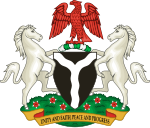Portal:Nigeria/Selected article/38
The federal government of Nigeria is composed of three distinct branches: the legislative, the executive, and the judicial, whose powers are vested and bestowed upon them by the Constitution of the Federal Republic of Nigeria, the National Assembly, the president, and lastly the federal courts, which includes the Supreme Court which is regarded as the highest court in Nigeria. One of the major functions of the constitution is that it provides for separation and balance of powers among the three branches and aims to prevent the repetition of past mistakes made by the government. Other functions of the constitution include a division of power between the federal government and the states, and protection of various individual liberties of the nation's citizens.
Nigerian politics takes place within a framework of a federal and presidential republic and a representative democracy, in which executive power is held by the president. Legislative power is held by the federal government and the two chambers of the legislature: the House of Representatives and the Senate, the legislative branch of Nigeria is responsible for and possesses powers for legislating laws. Together, the two chambers make up the law-making body in Nigeria, called the national assembly, which serves as a check on the executive arm of government. The National Assembly of Nigeria (NASS) is the democratically elected body that represents the interests of the Federal Republic of Nigeria and its people, makes laws for Nigeria and holds the Government of Nigeria to account. The National Assembly (NASS) is the nation's highest legislature, whose power to make laws is summarized in chapter one, section four of the 1999 Nigerian Constitution. Sections 47–49 of the 1999 Constitution state inter alia that "There shall be a National Assembly (NASS) for the federation which shall consist of two chambers: the Senate and the House of Representatives." The Economist Intelligence Unit rated Nigeria a "hybrid regime" in 2019. The federal government, state, and local governments of Nigeria aim to work cooperatively to govern the nation and its people. Nigeria became a member of the British Commonwealth upon its independence from British colonial rule on 1 October 1960.

